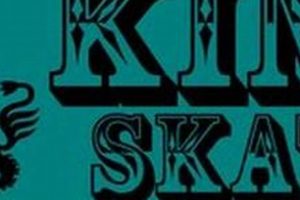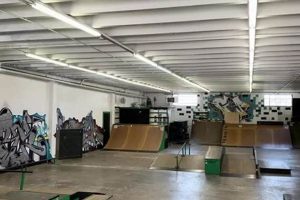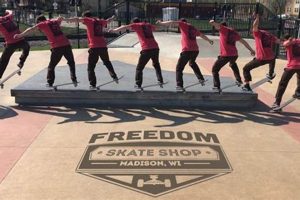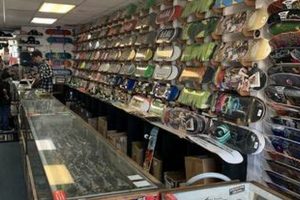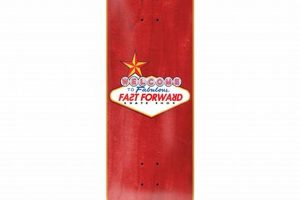A retail establishment specializing in equipment and accessories for skateboarding and related activities. These businesses typically offer a range of products, including skateboards, wheels, trucks, bearings, protective gear (helmets, pads), and apparel. For example, such an establishment might carry various skateboard brands, catering to different skill levels and preferences.
These specialized stores serve a crucial role in their local communities by providing expert advice, fostering a sense of community among skateboarders, and offering products tailored to the specific needs of riders. Historically, these shops evolved from general sporting goods stores to meet the growing demand for specialized skateboarding equipment. They often support local skateboarding scenes through sponsorships and events.
The following sections will delve deeper into specific aspects of the skate shop, including product offerings, services provided, community involvement, and factors contributing to its success. This exploration aims to provide a comprehensive understanding of its significance within the skateboarding ecosystem.
Essential Guidance
The following guidance provides key considerations for skateboarders when selecting equipment and maintaining optimal performance.
Tip 1: Assess Skill Level Accurately: Before purchasing a skateboard, objectively evaluate current skill level. Beginners should opt for complete skateboards designed for stability and ease of use, while experienced riders can customize components to match their riding style.
Tip 2: Prioritize Protective Gear: Always wear appropriate protective gear, including a helmet, knee pads, elbow pads, and wrist guards. This equipment significantly reduces the risk of injury during falls and collisions.
Tip 3: Select the Correct Skateboard Size: Consider both foot size and riding style when choosing a skateboard deck width. Wider decks offer increased stability, while narrower decks are more maneuverable.
Tip 4: Inspect Bearings Regularly: Maintain skateboard bearings by cleaning and lubricating them regularly. Clean bearings provide smoother rolling and enhance overall skateboard performance.
Tip 5: Choose Appropriate Wheel Durometer: Select wheel durometer based on the intended riding surface. Softer wheels provide better grip on rough surfaces, while harder wheels are faster on smooth surfaces.
Tip 6: Maintain Truck Tightness: Adjust truck tightness to achieve desired turning responsiveness. Looser trucks allow for sharper turns, while tighter trucks offer greater stability at higher speeds.
Tip 7: Replace Worn Components Promptly: Regularly inspect skateboard components, such as wheels, bearings, and grip tape, and replace them when worn to ensure safe and optimal performance.
Following these recommendations contributes to a safer and more enjoyable skateboarding experience. Proper equipment selection and maintenance are crucial for both beginner and experienced riders.
The subsequent sections of this article will explore specific product categories and services, providing further insights into optimizing skateboarding performance.
1. Equipment Variety
Equipment variety within a skateboarding retail establishment directly influences its appeal to a diverse customer base and its ability to cater to varying skateboarding disciplines. A broad selection enhances the shop’s competitiveness and its position as a comprehensive resource for skateboarders.
- Skateboard Decks
Offerings encompass a range of deck sizes, constructions (e.g., 7-ply maple, composites), and concave profiles. Different deck characteristics cater to different riding styles, such as street, park, or vert. A shop with limited deck options restricts customers to a narrower range of performance characteristics.
- Trucks
Truck selection involves variations in axle width, height, and kingpin configuration. These attributes impact turning responsiveness, stability, and grind clearance. Providing a comprehensive truck selection ensures compatibility with various deck sizes and riding preferences.
- Wheels
Wheel variety is characterized by durometer (hardness), diameter, and shape. Softer wheels offer increased grip on rough surfaces, while harder wheels provide higher speeds on smooth surfaces. Smaller wheels are suitable for technical street skating, while larger wheels are preferred for cruising and longboarding. A diverse wheel inventory allows riders to optimize performance for specific terrains.
- Bearings
Bearing selection focuses on ABEC rating (precision) and materials (steel, ceramic). Higher ABEC ratings indicate tighter tolerances and smoother rolling, while ceramic bearings offer enhanced durability and reduced friction. A comprehensive bearing inventory allows riders to fine-tune their setup for speed and performance.
The provision of extensive equipment variety, as exemplified by the categories above, allows a skateboarding retail establishment to meet the nuanced needs of its clientele. By offering a comprehensive selection, the shop positions itself as a central resource, promoting customer loyalty and fostering a stronger connection with the skateboarding community.
2. Expert Guidance
The provision of expert guidance constitutes a critical component of a successful skateboarding retail establishment. This informational exchange between shop personnel and customers directly impacts purchase decisions, equipment selection, and, ultimately, the safety and progression of skateboarders. The absence of informed advice can lead to inappropriate equipment choices, increasing the risk of injury and hindering skill development. This underscores the importance of knowledgeable staff within such businesses.
For instance, a novice skateboarder might enter the shop seeking a complete skateboard. Without expert guidance, this individual could select a board ill-suited to their size, weight, or intended use, resulting in a negative initial experience. Conversely, a skilled employee could assess the customer’s needs, recommending a board with appropriate dimensions, truck responsiveness, and wheel durometer. Furthermore, expert guidance extends beyond initial purchases, encompassing advice on equipment maintenance, repair techniques, and optimal component selection for specific terrains and riding styles. The skate shop becomes a trusted resource, fostering customer loyalty and solidifying its position within the local skateboarding community. Consider, for example, a scenario where a customer experiences recurring wheel slippage. Informed personnel can diagnose the issue, suggesting alternative wheel durometers or bearing lubrication practices to resolve the problem.
In conclusion, expert guidance is inextricably linked to the value proposition of a skate shop. Its presence enhances customer satisfaction, promotes safety, and fosters a supportive environment conducive to skill development. While online retailers may offer competitive pricing and product availability, they often lack the personalized, informed assistance provided by knowledgeable staff in a physical skate shop. This nuanced interaction represents a significant differentiator and a core element of a thriving skateboarding retail environment.
3. Community Hub
A pivotal function of a skateboarding retail establishment extends beyond mere commerce; it serves as a nexus for local skateboarding communities. The skate shop fosters social interaction, provides a platform for skill development, and reinforces the cultural identity of skateboarding within its immediate geographic area.
- Organized Events
Skate shops frequently host events such as skate jams, competitions, and product demonstrations. These gatherings provide opportunities for skateboarders of all skill levels to connect, share experiences, and compete in a supportive environment. These events are generally promoted by dalton skate shop on social media, in store, and online to promote skateboarding culture in the community.
- Knowledge Sharing
The environment of dalton skate shop encourages the exchange of knowledge between experienced riders and newcomers. Shop staff and veteran skateboarders often provide tips, advice, and guidance on technique, equipment maintenance, and local skate spots. This informal mentorship accelerates skill development and fosters a sense of camaraderie.
- Displaying Local Artwork
Skateboarding has a deep connection to art and design, and displaying local artwork reinforces its standing within the community. By displaying local artwork, dalton skate shop can promote local talents and give skateboarders a unique visual experience.
- Safe Space
By providing a welcoming atmosphere and fostering a sense of inclusivity, dalton skate shop has become a safe space for skateboarders. It is a place where they can be themselves without fear of judgment or discrimination. This helps them to connect with others who share their passion and build strong relationships.
The aforementioned facets collectively demonstrate the vital role a skateboarding retail establishment plays in cultivating a thriving skateboarding community. Beyond the sale of products, it serves as a central point of interaction, learning, and cultural exchange, enriching the lives of local skateboarders and strengthening the overall skateboarding scene.
4. Brand selection
Brand selection within a skateboarding retail establishment, such as the focal point of this exploration, directly influences consumer perception, product availability, and overall market positioning. A carefully curated brand portfolio is essential for attracting a diverse clientele and maintaining relevance within the competitive skateboarding market.
- Prestige Brands
The inclusion of established, well-regarded brands signals credibility and quality. These brands, often associated with professional skateboarders and historical significance, attract serious riders and enthusiasts. For example, stocking brands like Baker, Anti Hero, or Santa Cruz indicates a commitment to core skateboarding values. Failure to carry such brands may alienate a segment of the customer base.
- Emerging Brands
Introducing newer, less established brands demonstrates a forward-thinking approach and can attract customers seeking innovation or unique aesthetics. These brands may offer specialized products or cater to niche skateboarding styles. However, careful vetting is crucial; the establishment must ensure that emerging brands meet quality standards to avoid damaging its reputation. The introduction of new brands requires market research and awareness of current trends.
- Price Point Diversity
A comprehensive brand selection accounts for varying price points. Offering a range of brands allows the establishment to cater to customers with different budgets, from entry-level riders to seasoned professionals. Limiting brand selection to exclusively high-end or low-end options can restrict market reach and customer acquisition potential.
- Specialized Brands
Certain brands specialize in specific skateboarding disciplines, such as longboarding, vert riding, or street skating. Carrying these specialized brands allows the establishment to cater to niche communities within the broader skateboarding market. For instance, stocking downhill longboarding brands signals a commitment to this specific riding style and attracts a relevant customer base. This focus enhances market differentiation.
In summary, the strategic curation of brands significantly impacts the overall success of a skate shop. By considering factors such as prestige, innovation, price point, and specialization, the retail establishment can optimize its market position, attract a diverse customer base, and cultivate a thriving skateboarding community.
5. Repair Services
The provision of repair services by a skateboarding retail establishment directly enhances customer loyalty, prolongs equipment lifespan, and contributes to a sustainable business model. These services, ranging from basic maintenance to complex repairs, serve as a vital component of the shop’s overall value proposition.
- Bearing Maintenance and Replacement
Bearing maintenance, encompassing cleaning, lubrication, and replacement, directly affects skateboard performance. Dirty or damaged bearings impede rolling speed and maneuverability. A retail establishment offering bearing services allows customers to maintain optimal skateboard function without requiring specialized tools or expertise. For example, a skateboarder experiencing reduced speed can have their bearings professionally cleaned and lubricated, restoring their board’s performance. Timely bearing replacement prevents further damage to wheels and axles.
- Wheel Replacement
Wheels are subject to wear and tear from regular use, resulting in decreased grip, flat spots, and eventual failure. Replacing worn wheels is essential for maintaining safety and performance. A repair service offering wheel replacement ensures that customers have access to the appropriate wheel durometer and size for their riding style and terrain. Incorrect wheel selection can compromise safety and performance, highlighting the value of professional assistance.
- Truck Repair and Replacement
Trucks, which connect the wheels to the deck, can sustain damage from impacts and grinding. Repair services address issues such as bent axles, damaged kingpins, and worn bushings. Replacement services provide access to a variety of truck sizes and geometries to optimize board performance. A damaged truck can severely impair control and increase the risk of accidents, emphasizing the importance of prompt repair or replacement.
- Deck Mounting and Grip Tape Application
Proper deck mounting and grip tape application are crucial for skateboard safety and performance. Accurate alignment of trucks and precise application of grip tape ensure optimal board control and rider comfort. Repair services offer professional deck mounting and grip tape application, eliminating the risk of improper installation. Misaligned trucks or poorly applied grip tape can compromise rider safety and hinder skill development.
These services, when offered comprehensively, reinforce the importance of the skateboarding retail establishment as a reliable resource for maintaining equipment and prolonging its usable life. This proactive approach enhances customer satisfaction and fosters a stronger connection with the skateboarding community.
6. Protective Gear
The availability and promotion of protective gear within a skateboarding retail establishment like Dalton Skate Shop are paramount for mitigating injury risks and fostering a safety-conscious environment. The shops role extends beyond merely selling equipment; it encompasses educating customers on the importance of injury prevention through proper protective measures.
- Helmet Selection and Education
Helmets are arguably the most critical piece of protective gear, significantly reducing the risk of head injuries during falls. Dalton Skate Shop should offer a diverse range of helmet sizes, styles (e.g., full-cut, half-shell), and certifications (e.g., ASTM, CPSC) to cater to various head sizes and riding preferences. Staff should educate customers on proper helmet fit, emphasizing the importance of a snug but comfortable fit that does not impede vision. Failure to wear a properly fitted helmet substantially increases the risk of severe head trauma. For example, shop personnel could demonstrate how to adjust helmet straps and explain the different types of impact absorption technology. This proactive approach encourages helmet use and reduces the likelihood of head injuries.
- Pad Sets (Knee, Elbow, Wrist)
Knee, elbow, and wrist pads offer crucial protection against abrasions, contusions, and fractures during falls. Dalton Skate Shop should stock pad sets in various sizes and styles to accommodate different body types and riding styles. Emphasis should be placed on the importance of secure and properly fitted pads that do not restrict movement. For instance, ill-fitting pads may slide out of place during a fall, rendering them ineffective. Shop staff should advise customers on selecting pads that provide adequate coverage and impact absorption. Furthermore, demonstrations on how to properly secure pads can ensure optimal protection.
- Mouthguards
Mouthguards offer protection against oral injuries, such as broken teeth and jaw fractures, which are particularly important for skateboarders. Dalton Skate Shop should offer mouthguards in different sizes and styles, with information provided on proper fitting and maintenance.
- Impact Shorts
Impact shorts are designed to protect the hips, tailbone, and upper thighs from bruising and fractures. Dalton Skate Shop should stock impact shorts in various sizes and styles, particularly beneficial for beginners who often sustain falls in these areas.
By prioritizing the availability and promotion of high-quality protective gear, Dalton Skate Shop demonstrates a commitment to customer safety and well-being. This proactive approach not only reduces the risk of injury but also fosters a more confident and enjoyable skateboarding experience. The integration of education and product demonstration enhances the shop’s value proposition, solidifying its role as a trusted resource within the skateboarding community.
7. Local events
The connection between local events and Dalton Skate Shop operates as a mutually beneficial ecosystem. Local events, encompassing skateboarding competitions, demonstrations, and workshops, provide a direct platform for Dalton Skate Shop to engage with its target demographic, increase brand visibility, and foster community loyalty. Dalton Skate Shop, in turn, supports these events through sponsorships, product provision, and logistical assistance, contributing to their success and sustainability. The absence of this symbiotic relationship diminishes both the vibrancy of the local skateboarding scene and the potential market reach of the shop. As an example, Dalton Skate Shop sponsoring a local competition directly translates into increased brand awareness among attendees, who are potential customers. The shop’s logo is displayed prominently, and its products are showcased, resulting in heightened visibility. This type of engagement is more effective than traditional advertising methods due to its targeted reach and authentic connection with the skateboarding community.
Further analysis reveals that the success of local events directly influences the economic performance of Dalton Skate Shop. Well-attended and well-organized events generate positive word-of-mouth marketing, attracting new customers to the shop. Moreover, these events provide opportunities for the shop to test new products, gather customer feedback, and identify emerging trends within the skateboarding community. For instance, a successful product demonstration at a local event can lead to increased sales and heightened brand recognition. The practical application of this understanding lies in the need for Dalton Skate Shop to actively seek and cultivate partnerships with local event organizers. This involves not only financial sponsorship but also active participation in the planning and execution of events. This hands-on approach fosters a stronger relationship with the community and ensures that the shop’s involvement is perceived as genuine and supportive.
In conclusion, the bond between local events and Dalton Skate Shop represents a crucial component of the shop’s overall success. Challenges may arise in securing sponsorship opportunities and effectively measuring the return on investment from event participation. However, the benefits of increased brand visibility, community engagement, and customer acquisition outweigh these challenges. The integration of local events into the shop’s marketing strategy is essential for sustaining its long-term growth and solidifying its position as a cornerstone of the local skateboarding community.
Frequently Asked Questions
The following addresses common inquiries regarding products and services offered.
Question 1: What factors determine the appropriate skateboard deck size?
Skateboard deck size selection depends primarily on the rider’s foot size and intended skateboarding discipline. Larger feet generally necessitate wider decks for stability. Street skating typically favors narrower decks for enhanced maneuverability, while park and transition skating may benefit from wider decks for increased stability.
Question 2: How frequently should skateboard bearings be cleaned and lubricated?
Skateboard bearings should be cleaned and lubricated regularly to maintain optimal performance. The frequency depends on usage conditions. Skateboarding in dusty or wet environments necessitates more frequent maintenance. A general guideline is to clean and lubricate bearings every two to four weeks for regular use.
Question 3: What is the significance of skateboard wheel durometer?
Skateboard wheel durometer, measured on the A scale, indicates wheel hardness. Softer wheels (lower durometer numbers) offer increased grip and a smoother ride on rough surfaces. Harder wheels (higher durometer numbers) provide greater speed and roll efficiency on smooth surfaces. Wheel durometer selection should align with the intended riding terrain.
Question 4: How can proper skateboard helmet fit be ensured?
Ensuring proper skateboard helmet fit is crucial for safety. The helmet should sit level on the head, covering the forehead. The chinstrap should be snug but not constricting. The helmet should not move excessively when shaking the head. If a helmet does not fit securely, a different size or model should be considered.
Question 5: What are the key considerations when selecting skateboard trucks?
Key considerations for skateboard truck selection include axle width, hanger width, and height. Axle width should correspond to the skateboard deck width. Hanger width affects turning responsiveness. Truck height influences wheel clearance and stability. Truck selection should align with the rider’s preferences and skateboarding style.
Question 6: How does participation in local skateboarding events benefit the community?
Participation in local skateboarding events fosters community engagement, promotes skill development, and provides a platform for showcasing talent. These events contribute to the overall vibrancy of the skateboarding scene and offer opportunities for social interaction and mentorship among riders.
These points represent fundamental aspects of skateboarding equipment and community engagement. Adherence to these principles can enhance the overall skateboarding experience.
The subsequent section will address advanced equipment considerations.
Final Assessment
This exploration has illuminated the multifaceted nature of Dalton Skate Shop as a retail entity extending beyond mere commerce. Key facets examined include equipment variety, expert guidance, community engagement, brand representation, repair capabilities, protective gear provision, and participation in local events. These elements, when strategically integrated, define the shop’s significance within the skateboarding ecosystem.
The continued evolution of skateboarding necessitates that such establishments remain adaptable and responsive to emerging trends. Commitment to quality, community support, and informed service are critical for sustained relevance. This analysis underscores the inherent value of a specialized retail environment in fostering the growth and integrity of skateboarding culture.


